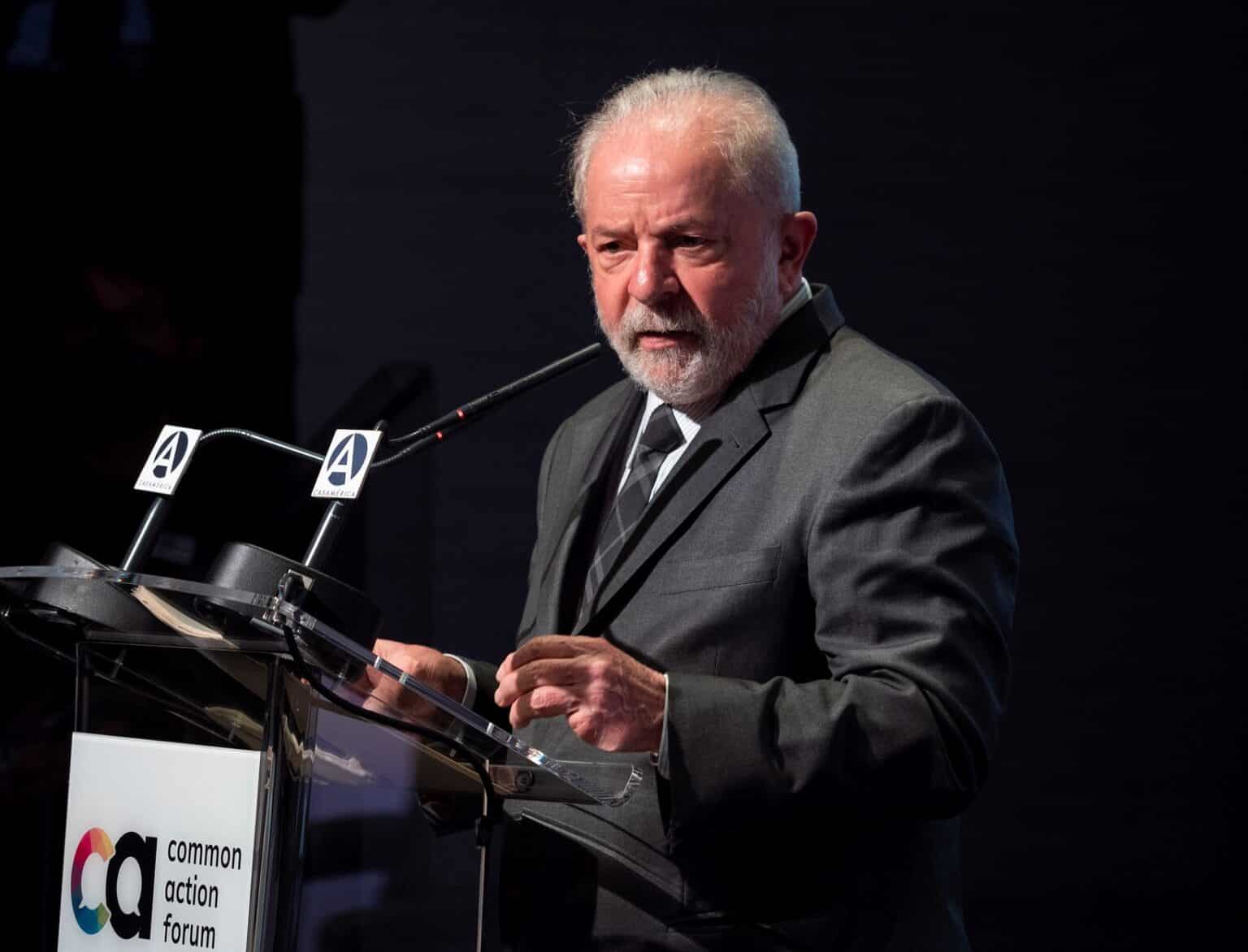In his first speech after staging a stunning political comeback at Brazil’s presidential elections, Luiz Inácio Lula da Silva vowed to halt the Amazon deforestation that surged under outgoing rival Jair Bolsonaro.
In order to succeed, Lula won’t just need to face down farmers, loggers, and miners. He will also have to win a battle of ideas.
While libertarian think tanks have been a familiar feature of the North American and British political landscape for decades, Brazil’s homegrown equivalents have risen to prominence more recently.
Promoting a similar form of radical free-market economics to their English-speaking cousins, these groups provided the intellectual foundation for Bolsonaro’s dismantling of environmental protections. Their international allies range from climate science denying organisations to former UK Prime Minister Liz Truss.
None of Brazil’s think tanks has been more influential during Bolsonaro’s four-year presidency than Rio de Janeiro-based Instituto Millenium, or IMIL.
“They not only help shape the government’s economic policies, they also construct narratives to legitimise the environmental destruction occurring in Brazil’s main biomes – mainly in the Amazon,” Carlos Milani, a professor of international relations at Rio de Janeiro State University, told DeSmog.
“These anti-environment stances also have human rights implications: continuous violations of the rights of the original Indian peoples in the Amazon, who are threatened by the expansion of agribusiness and extractivism in the region,” Milani said.
IMIL’s chairman, Sebastião Ventura P. da Paixão Jr, has cast Bolsonaro’s defeat as a setback for the entire continent, writing that Latin America is “submerging into a dangerous regression to socialism, guided by wrong-headed, backward economic ideas that never worked anywhere.”
The think tank has regularly defended Bolsonaro’s moves to open up the Amazon, in line with its free-market philosophy. The former army captain argued that economic development would boost living standards for Indigenous communities, and said it was hypocritical of Western countries to criticise Brazil when they had cleared their own forests centuries ago.
Leading the Finance Ministry
IMIL figures have also played prominent roles in Bolsonaro’s administration. At least eight founders or members of the organisation have served in the right-wing populist’s government, most notably Paulo Guedes, his finance minister and a former student of the free-market economist Milton Friedman.
Other IMIL members have been given key roles in Guedes’ ministry, leading the drive to privatise state-owned companies such as oil giant Petrobras.
Ricardo Salles, who used his position as environment minister to weaken policies to protect the Amazon, has also worked with IMIL through his right-wing movement, Movimento Endireita Brasil. Despite being forced to resign last year after obstructing a police investigation into illegal logging, Salles was re-elected in September’s legislative elections.
IMIL has many supporters in the media, too, including João Roberto Marinho, executive president of Grupo Globo, Latin America’s largest media conglomerate; Antonio Carlos Pereira, a former director of O Estado de S.Paulo (Estadão), Brazil’s third largest newspaper, and columnists at other major newspapers.
Neither IMIL, nor any of its founders or members, responded to DeSmog’s requests for comment.
When DeSmog looked into IMIL’s funding, relying on a now-deleted page from its website, we found numerous donors linked to environmentally damaging industries. They include Daniel Feffer, the billionaire vice chairman of Suzano Papel e Celulose, a Brazilian pulp and paper company; Adriano Pires, chief executive of the Centro Brasileiro de Infraestrutura, a lobbying firm for the oil and gas sector; William Ling, who owns logging, plastics, and aluminium companies; and Jorge Gerdau, a steel magnate.
Suzano, the only one of these companies to respond to a request for comment, said it “does not maintain any relationship with Instituto Millenium”. A spokesperson said the company had a “strict zero deforestation policy” as well as “strong commitments to action on climate change”. A spokesperson for Feffer declined to comment.
Climate Denial
IMIL has been a prominent source of climate misinformation in Brazil, allowing it to downplay the vital role the Amazon plays as a carbon sink regulating the Earth’s climate. The group shares this stance with fellow members of the Atlas Network – a global free-market umbrella organisation whose supporters have played a key role in promoting climate science denial, aided financially by the fossil fuel industry, with a particular presence in the United States.
Numerous IMIL figures have dismissed climate change – a stance for which Bolsonaro has faced international criticism during his presidency – both in articles on IMIL’s website and in other public arenas.
Helio Beltrão, a founder of IMIL, columnist at Folha de S.Paulo, board member of fuel distribution company Grupo Ultra, and president of the Instituto Mises Brasil – another libertarian think tank – has said there is “no consensus” about the link between carbon dioxide emissions and climate change.
Rodrigo Constantino, another founder, columnist at Gazeta do Povo, and president of the libertarian Instituto Liberal, has accused scientists of deceptively using the term “climate change”, rather than “global warming”, in order to blame all extreme weather events on the phenomenon.
Uma tarde com troca de boas ideias para as relações Brasil-Reino Unido! Na foto, a CEO do Imil, Priscila Pereira Pinto, posa com a secretária-chefe do Tesouro Britânico, @trussliz; o especialista do Imil, @MarcosTroyjo; e os sócios da Rio Bravo Investimentos. #UKnoBrasil pic.twitter.com/15jgQXTs97
— Instituto Millenium (@instmillenium) April 11, 2018
Truss Visit
IMIL has a connection to the UK through Liz Truss, a darling of Britain’s radical pro-business think tanks who resigned as prime minister last month after a tumultuous 44 days in office. Truss’s downfall began shortly after her Chancellor Kwasi Kwarteng announced a “mini-budget” of unfunded tax cuts. The move, which triggered market turmoil, was widely blamed on the policy prescriptions of groups such as the Institute of Economic Affairs, a long-time ally of Truss and another Atlas Network member.
Truss met with IMIL in April 2018, while serving as chief secretary to the Treasury – six months before Bolsonaro was elected president. Minutes from the meeting, obtained by DeSmog through a freedom of information request to the British government, show they discussed the upcoming elections, strategies for getting young people involved in politics, and Brazil’s ambition to join the OECD.
“It was noted that you don’t need to win everyone over, ideas gain momentum,” the minutes said.
Among the attendees was IMIL co-founder Marcos Troyjo, who went on to become Bolsonaro’s deputy economy minister and special secretary for foreign trade and international affairs. Troyjo is now president of the New Development Bank, a multilateral development bank set up by Brazil, Russia, India, China, and South Africa.
In the wake of the official visit, Truss praised IMIL as “free-thinkers” in an article headlined “Take heart from Latin American capitalists showing the way”.
Truss wrote of how the UK “stands to benefit from stable friends” and how Brazil was “working hard to keep control of their public finances”. There was a need to “work with like-minded allies to spread the message” of free markets, she said, crediting IMIL with helping to “change the culture” in the country.
Truss did not meet any other political groups during her trip.
Christian Poirer, programme director at the Amazon Watch advocacy group, told DeSmog it was “outrageous” for Truss to meet a think tank like IMIL. “The UK should have no role in promoting climate denial or the deregulation of the Amazon,” he said.
One other item on Truss’s itinerary was a trip to a multi-million pound research institute jointly-funded by Anglo-Dutch oil giant Shell that promotes natural gas and biofuels as sustainable, followed by a visit to an oil rig “simulator” run by Petrobras.
UK oil companies Shell and BP have major interests in Brazil, particularly in the vast deepwater reserves off the country’s southeast coast. Their growing presence, facilitated in part by lobbying from the UK government, has been warmly welcomed by Paulo Guedes.
The UK has also supported Brazil’s Petrobras through its export credit agency – including two credits issued between 2018 and 2020 worth more than £300 million in total.
A Cabinet Office spokesperson declined to confirm whether Truss had had any contact with IMIL since her meeting or answer a series of other questions about the trip, saying that the government “remains fully committed to its transparency agenda and releases more proactive publications than ever before”.
New think-tank @instmillenium committed to free speech and free markets. Median age in Brazil under 30 and they want more freedom and less Big State. #newflame #liberdade #freedomfighters @Freer_UK pic.twitter.com/7E9yg1NJpX
— Liz Truss (@trussliz) April 12, 2018
Old Foes
IMIL’s global links will come as little surprise to Lula, who has been squaring off against the think tank since his first stint as president from 2003-2011.
Originally called the Instituto de Estudos da Realidade Nacional, or the Institute of National Reality Studies, the organisation was launched in 2005 with the express intention of countering Lula’s popular embrace of left-wing policies.
In those days, there were only a handful of right-wing think tanks in Brazil. By the time Lula’s successor, Dilma Rousseff, was impeached in 2016, there were more than 30, according to Camila Vidal, professor of international relations at the Federal University of Santa Catarina.
IMIL follows the model of many U.S. groups in advocating a mix of economic liberalism and social conservatism, while seeking academic backing and disseminating its ideas through magazines, newspapers, and increasingly social media, Vidal said.
Numerous publications from the group reviewed by DeSmog support environmentally damaging activities and criticise efforts to tackle them. Recent publications argue that agribusinesses have nothing to do with widely-reported fires across the Amazon; that Brazil is a leader in protecting the environment and that international green organisations give it an unwarranted level of attention; that Brazilian cattle ranching suffers intense “prejudice and misinformation”, including around its well-known contribution to climate change; and that greater investment is needed in fossil fuels.
By contrast, no articles critical of Amazon deforestation in recent years have come up in the course of Vidal’s research.
Pedro Allemand, a Ph.D. candidate at the Pontifical Catholic University of Rio de Janeiro’s Institute of International Relations, said IMIL provides “the discourse and the narratives to sweep environmental destruction under the carpet”.
“Their position as a think tank allows them to offer justifications for the dismantling of the environmental preservation apparatus, even if they are not directly involved in the activities,” he said.
While Lula’s victory has kindled hopes that the Amazon may yet be saved from irreversible damage, his government will have to contend with the influence of IMIL and other think tanks who have proved so influential in shaping Bolsonaro’s policies.
“We are not interested in a war for the environment,” Lula – whose time in office wasn’t without criticism in this area – said on Sunday night. “But we are ready to defend it from any threat.”
Additional research by Lucas Araldi.
Subscribe to our newsletter
Stay up to date with DeSmog news and alerts







